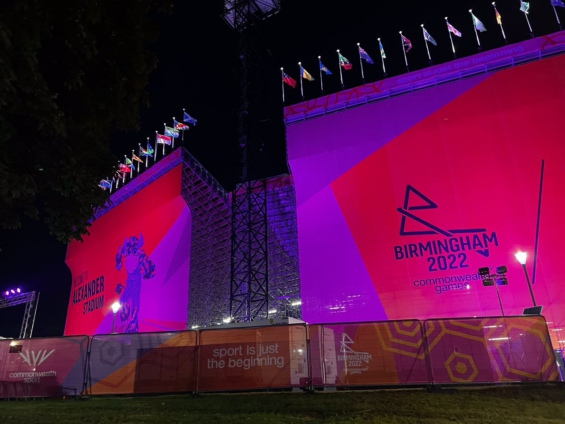Athletes from the 72 Commonwealth Games Associations, including Ghana, will come together in Birmingham to battle it out for sporting glory from 28 July to 8 August, 2022.
The multi-sport events will feature 280 finals across 20 sports and this is your guide to the action that is about to unfold.
Who and what to look out for?
Australia (2,415 medals) and England (2,144) have been the most successful nations at the games and will be expected to dominate the medal table once again.
From an African perspective, South Africa (389), Kenya (237) and Nigeria (236) are the most decorated nations from the continent and 2022 will present them with the opportunity to close the gap to those ahead of them on the all-time medal table.
The Athletics programme will be peppered with star power, with the likes of Jamaican sprint trio Shelly-Ann Fraser-Pryce, Elaine Thompson-Herah and Shericka Jackson set to delight the fans.
The long and middle-distance runners of Africa are set to shine on a grand stage yet again while stars Ferdinand Omayala and Wayde van Niekerk will be looking to overcome World Championships disappointments.
The likes of Zach Stubblety-Cook, Molly O’Callaghan and Kaylee McKeown will be on the hunt to further their personal medal hauls in the pool, while Chad le Clos will be gunning to become the most decorated Commonwealth Games athlete.
Tatjana Schoenmarker will return to a major stage for the first time since breaking the 200m breaststroke world record at Tokyo 2020 and will be hoping to add the Commonwealth Games medal to her trophy cabinet.
Cricket will be making a return to the games for the first time in 24 years in the form of a women’s T20 tournament.
South Africa, England, Australia and India will be the most favoured of the eight nations to reach the semifinals while New Zealand and Pakistan will be out to spoil their plans.
Last time out, England broke the monopoly of Australia and New Zealand’s domination of the Netball tournament.
The three will, again, likely be the semifinal contenders while the last spot in the final four will be left for the likes of South Africa and Jamaica to fight over.
South Africa broke New Zealand’s stranglehold on the Rugby Sevens gold medal in 2014 but the Kiwis returned to the throne in 2018, with the South Africans finishing fourth.
That is just the tip of the iceberg, with action from sports like badminton, 3x3 basketball, beach volleyball, boxing, cycling, gymnastics, hockey, lawn bowls, shooting, squash, table tennis, triathlon, weightlifting and wrestling all on show in Birmingham.
Where will it happen?
Birmingham, ‘The Second City’, will play host to the more than 5,000 athletes looking to etch their names into the history books.
Athletes and officials alike will be housed at three campuses close to the competition venues at the University of Birmingham, the University of Warwick and the NEC Hotel.
The newly-renovated Alexander Stadium is the centrepiece of the competition venues with both the opening and closing ceremonies as well as the athletics programme all taking place inside its walls.
Elsewhere, the Arena Birmingham, Edgebaston Cricket Ground, Smithfield, Sutton Park, Victoria Square and the University of Birmingham will all play host to the athletes in some capacity.
The action will not be confined to Birmingham itself as venues throughout the West Midlands Region have been prepared for a variety of sporting codes while the track cycling competition will play out at the Lee Valley VeloPark in London.
How will it happen?
The father of the Commonwealth Games, Melville Marks Robinson, was inspired by the ‘spirit of friendly competition’ to form the British Empire Games in 1930, which featured 11 nations and six sports.
The games continued to be held every four years (except for 1942 and 1946 due to WW2) under different guises from 1934 to 1974 until it underwent its final transformation in 1978 to become the Commonwealth Games. The inclusion of the athletes with disabilities as full members of their national teams made the Commonwealth Games the first fully-inclusive international multi-sport event.
Latest Stories
-
Expansion Drive: Takoradi Technical University increases faculties
1 minute -
SHS heads demand payment of outstanding funds before reopening of schools
37 minutes -
We thank God for the 2024 general elections – Akufo-Addo
51 minutes -
Coconut Grove Beach Resort marks 30 years of excellence with memorable 9 lessons & carols service
1 hour -
WAFU B U-17 Girls’ Cup: Black Maidens beat Nigeria on penalties to win inaugral tournament
2 hours -
Real Madrid beat Sevilla to keep pressure on leaders Atletico
3 hours -
Liverpool put six past Spurs to go four points clear
3 hours -
Manchester United lose 3-0 at home to Bournemouth yet again
3 hours -
CHAN 2024Q: ‘It’s still an open game’ – Didi on Ghana’s draw with Nigeria
3 hours -
CHAN 2024Q: Ghana’s Black Galaxies held by Nigeria in first-leg tie
4 hours -
Dr Nduom hopeful defunct GN bank will be restored under Mahama administration
5 hours -
Bridget Bonnie celebrates NDC Victory, champions hope for women and youth
5 hours -
Shamima Muslim urges youth to lead Ghana’s renewal at 18Plus4NDC anniversary
6 hours -
Akufo-Addo condemns post-election violence, blames NDC
6 hours -
DAMC, Free Food Company, to distribute 10,000 packs of food to street kids
7 hours

